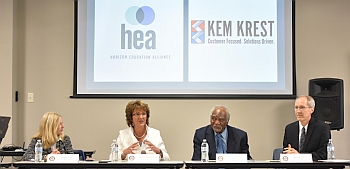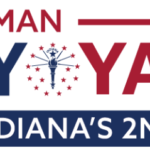 U.S. Rep. Jackie Walorski (R-Ind.), the top Republican on the House Ways and Means Worker and Family Support Subcommittee Jackie Walorski, on Tuesday joined subcommittee Chairman Danny K. Davis (D-Ill.) in introducing bipartisan legislation to support the transformation of state child welfare systems across the country. They announced the Family First Transition Act as Walorski hosted Davis in northern Indiana for discussions on child welfare and workforce development issues.
U.S. Rep. Jackie Walorski (R-Ind.), the top Republican on the House Ways and Means Worker and Family Support Subcommittee Jackie Walorski, on Tuesday joined subcommittee Chairman Danny K. Davis (D-Ill.) in introducing bipartisan legislation to support the transformation of state child welfare systems across the country. They announced the Family First Transition Act as Walorski hosted Davis in northern Indiana for discussions on child welfare and workforce development issues.
Walorski and Davis agreed earlier this year to visit each other’s districts in order to advance their work together to help American workers and families thrive through innovative and evidence-based policies, including implementation of the Family First Prevention Services Act, which was signed into law in February 2018. In August, Walorski joined Davis in his Chicago district to visit several local organizations focused on helping vulnerable families and ending poverty. This week, Walorski hosted Davis in Indiana, where they:
- Heard from Indiana Department of Child Services Director Terry Stigdon and child welfare advocates at Oaklawn in Mishawaka about Indiana’s efforts to implement Family First and improve services for children and families;
- Learned about the partnership between the Horizon Education Alliance and Kem Krest in Elkhart, including the importance of apprenticeships to training the next generation of workers; and
- Visited the Lab for Economic Opportunities (LEO) at the University of Notre Dame for an update on their innovative research into evidence-based solutions to fight poverty.
“The bipartisan Family First law will transform the child welfare system into one that prioritizes the needs of children and families so fewer kids need to enter foster care,” Congresswoman Walorski said. “The next step is the Family First Transition Act, which will give states the time and resources they need to implement evidence-based solutions that help at-risk children and keep families together. I’m grateful that Chairman Davis and I have further strengthened our partnership with visits to each other’s communities, and I look forward to continuing our work together to help families thrive.”
“The new Family First Prevention Services Act has the potential to transform lives by reaching out to address the reasons families are struggling and strengthen them, rather than separating them,” Congressman Davis said. “The Family First Transition Act will make sure states, including my home state of Illinois, are fully able to do this hard but important work. I am delighted to work closely with Ranking Member Walorski to understand the successes and challenges within our communities to inform our policies. I also am pleased to continue working with our bipartisan, bicameral partners and our leadership to advance this bill and make Family First a success for families in my congressional district and across the nation.”
BACKGROUND
Ranking Member Walorski and Chairman Davis, along with Senate Finance Committee Chairman Chuck Grassley (R-Iowa) and Ranking Member Ron Wyden (D-Ore.), introduced the bipartisan, bicameral Family First Transition Act to help states transform their child welfare systems and keep more children safely at home, instead of placing them in foster care. The legislation would provide states with the tools to successfully implement the Family First law.
Family First, which will help keep more children safely with their families and out of foster care, supports states in providing evidence-based services to prevent children from entering foster care, encourages states to place children with foster families instead of in group homes and reduces bureaucracy for – and provides help to – relatives so more children can live with extended family if they must be removed from their homes.
The Family First Transition Act (H.R. 4980) will build on the existing law by:
- Providing insurance to states with child welfare demonstration projects that ended on October 1, 2019, guaranteeing they will not face a large financial shortfall as they transition to the new law;
- Providing one-time funding to all states to help implement Family First; and
- Phasing in the Family First requirement that 50 percent of spending on foster care prevention be on programs meeting the highest level of evidence (“well supported”), allowing states to receive reimbursement for a broader range of evidence-based services in early years while the U.S. Department of Health and Human Services works to expand its list of qualifying programs.
Full text of the legislation can be found here. A summary of the bill can be found here.
Walorski represents the 2nd Congressional District of Indiana, serving as a member of the House Ways and Means Committee.














